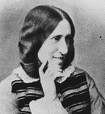Mary Anne Evans (1819 - 1880)
Mary Anne Evans was born on 22 November 1819 on the 7000-acre Arbury estate near Nuneaton where her father
Robert Evans was land agent to the Newdigate family. She was brought up at Griff farmhouse where her family moved
early in 1820, and where her mother ran a dairy.
Her first literary works were translations from German of two influential works on religion.
The first was published anonymously, the second as by 'Marian Evans'. David Friedrich Strauss, Das Leben Jesu
(1835), translated as The Life of Jesus, Critically Examined (1846) and Ludwig Feuerbach, Das Wesen Christentums
(1841) translated as The Essence of Christianity (1854). For more details of these works see under Jesus.
Her life with George Henry Lewes, from 1854 to his death in 1876, although initially scandalous, provided a stable
home life against which she wrote, under the name of 'George Eliot', the novels for which she is most remembered.
In May 1880 she married her business manager, John Walter Cross, but died in December that year.
An excellent biography is Kathryn Hughes: George Eliot: The Last Victorian (Fourth Estate 1999).
The Choir Invisible
"Although she could not allow herself the easy consolation of an orthodox
view of heaven, the Positivist's idea that the essence of the departed person remains
in the memories of those left behind became an increasing comfort to Marian. It was to
form the main theme of her best-known poem 'O May I Join the Choir Invisible', which
the Positivists adopted as their anthem." [Hughes p.315]
O MAY I join the choir invisible
Of those immortal dead who live again
In minds made better by their presence: live
In pulses stirr’d to generosity,
In deeds of daring rectitude, in scorn
For miserable aims that end with self,
In thoughts sublime that pierce the night like stars,
And with their mild persistence urge man’s search
To vaster issues.
— So to live is heaven:
To make undying music in the world,
Breathing as beauteous order that controls
With growing sway the growing life of man.
So we inherit that sweet purity
For which we struggled, fail’d, and agoniz’d
With widening retrospect that bred despair.
Rebellious flesh that would not be subdued,
A vicious parent shaming still its child,
Poor anxious penitence, is quick dissolv’d;
Its discords, quench’d by meeting harmonies,
Die in the large and charitable air.
And all our rarer, better, truer self,
That sobb’d religiously in yearning song,
That watch’d to ease the burthen of the world,
Laboriously tracing what must be,
And what may yet be better,—saw within
A worthier image for the sanctuary,
And shap’d it forth before the multitude,
Divinely human, raising worship so
To higher reverence more mix’d with love,—
That better self shall live till human Time
Shall fold its eyelids, and the human sky
Be gather’d like a scroll within the tomb Unread forever.
—This is life to come,
Which martyr’d men have made more glorious
For us who strive to follow. May I reach
That purest heaven, be to other souls
The cup of strength in some great agony,
Enkindle generous ardor, feed pure love,
Beget the smiles that have no cruelty,
Be the sweet presence of a good diffus’d,
And in diffusion ever more intense!
So shall I join the choir invisible
Whose music is the gladness of the world.
